|
|
|
Sort Order |
|
|
|
Items / Page
|
|
|
|
|
|
|
| Srl | Item |
| 1 |
ID:
144939
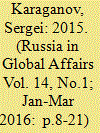

|
|
|
|
|
| Summary/Abstract |
The year 2015 will go down in history as a watershed. Firstly, it was extremely rich in anniversaries. The world marked 70 years since the establishment of the United Nations, an organization that laid the foundations of the postwar system of international relations. It was also 70 years since the tragic beginning of the nuclear age when two Japanese cities were bombed. The emergence of nuclear weapons was perhaps the most important event of the postwar period in world history. Last year saw the 40th anniversary of the Helsinki Final Act, the 25th anniversary of the fall of the Berlin Wall, and the adoption of the Charter of Paris for a New Europe, a document that promised a fair and stable European security system. However, 2015 finally turned that ideal into a shattered dream. Secondly, and most importantly, 2015 marked the end of the postwar era and the post-Cold War period. Now we are entering an era shaped by new major international trends that are coming to the fore. Thirdly, last year was perhaps the most successful for Russian foreign policy in the last quarter of a century. Yet it did not solve Russia's main problem: the deepening stagnation of the economy that can reverse any progress.
|
|
|
|
|
|
|
|
|
|
|
|
|
|
|
|
| 2 |
ID:
139725
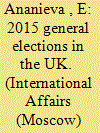

|
|
|
|
|
| Summary/Abstract |
Labour, Lib-Dems and UKIP suffered a crushing defeat, along with the analysts (me included) who had never expected that the Tories would win by a vast majority to knock together a one-party cabinet. For at least a month and a half before the elections, all public opinion polls indicated that the two leading parties were running neck and neck, so to speak with about 33-34 percent of the voters prepared to support either Labour or Tories. The aggregate rating of the smaller parties (slightly less than 70 percent) indicated that they stood a good chance to get a place in the sun.
|
|
|
|
|
|
|
|
|
|
|
|
|
|
|
|
| 3 |
ID:
144180
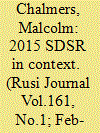

|
|
|
|
|
| Summary/Abstract |
Significant new investment in defence and security announced in the 2015 National Security Strategy and Strategic Defence and Security Review has sent positive signals about the future of the UK’s role in the world. However, argues Malcolm Chalmers, further reform and flexibility will be needed if the UK is to remain an important security player in the international arena.
|
|
|
|
|
|
|
|
|
|
|
|
|
|
|
|
| 4 |
ID:
145429
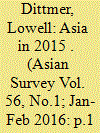

|
|
|
| 5 |
ID:
139637
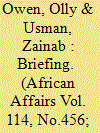

|
|
|
|
|
| Summary/Abstract |
“A DO OR DIE AFFAIR” IS A COMMON DESCRIPTION of Nigerian elections, which underlines the competitiveness and acrimony that characterize the quadrennial political ritual. The recently concluded 2015 general elections were fiercer than most, with expectations that they would end in a contentious stalemate at best, and engulf the country in violent political crisis at worst. Many people stockpiled food, the affluent and many expatriate workers took strategically timed holidays abroad, and Nigerians in regions of the country distant from their birthplaces sent their families home in expectation of a prolonged post-election crisis. Yet, in the end, the actual conduct and outcome of the elections defied expectations. Not only did Nigeria conduct its most credible and transparent elections since independence with minimal violence but, for the first time in the country's history, an opposition party – the All Progressives Congress (APC) – defeated an entrenched ruling party (the Peoples' Democratic Party, PDP). The peaceful and credible conduct of these polls has set Nigeria on a trajectory towards consolidating its democracy, transitioning from a largely unstable and expedient experiment in 1999 to the realm of political maturity. This briefing discusses how this was achieved despite the challenging context.
|
|
|
|
|
|
|
|
|
|
|
|
|
|
|
|
| 6 |
ID:
149659
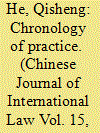

|
|
|
|
|
| Summary/Abstract |
This survey is composed of materials reflecting the practice of private international law in China in 2015. First, this survey covers the reports of the Supreme People’s Court (SPC) released in 2016, notably the Report on the Work of the SPC in 2015, which contains the statistics of the foreign-related civil or commercial cases accepted and concluded by Chinese courts. Second, the survey covers laws and judicial interpretations that were revised or took effect in 2015.
|
|
|
|
|
|
|
|
|
|
|
|
|
|
|
|
| 7 |
ID:
145408
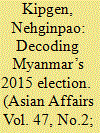

|
|
|
|
|
| Summary/Abstract |
The election helps the democratization process move forward. However, the nature of power transition suggests that some authoritarian elements are likely to remain entrenched. The article (which gives a full account of the election including the election process, the parties involved, the results and the negotiations following the elections including those involving Aung Sang Suu Kyi) argues that holding of a free and fair election is important for democratization but does not guarantee a successful transition to consolidated democracy.
|
|
|
|
|
|
|
|
|
|
|
|
|
|
|
|
| 8 |
ID:
140273
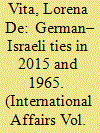

|
|
|
|
|
| Summary/Abstract |
This article marks the fiftieth anniversary of the establishment of diplomatic relations between the Federal Republic of Germany and Israel. It is divided into two parts, assessing the status of this unique relationship in 2015 and in 1965, respectively. Angela Merkel's recent criticism of Benjamin Netanyahu's stance on the peace process with the Palestinians and the heavy protests that took place in Germany in the wake of Operation Protective Edge in Gaza in summer 2014 have cast doubt on the strength of the bilateral partnership fifty years after the first exchange of ambassadors between the two countries. However, by examining the state of German–Israeli cooperation in a number of areas (security, commerce and knowledge exchange, among others), the first part of the article challenges popular interpretations of contemporary German–Israeli relations as being ‘at a nadir’. Fifty years ago, Chancellor Ludwig Erhard proposed to his Israeli counterpart Levi Eshkol the establishment of diplomatic relations between the two countries amid a severe political crisis in Bonn, following a visit of the East German leader Walter Ulbricht to Gamal Abdel Nasser. While much has changed since then, the second part of the article argues that looking at the momentous events of 1965 can provide useful reference points for understanding the current state of relations between Germany and Israel.
|
|
|
|
|
|
|
|
|
|
|
|
|
|
|
|
| 9 |
ID:
156470
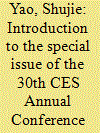

|
|
|
| 10 |
ID:
146969
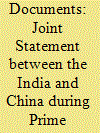

|
|
|
| 11 |
ID:
146745
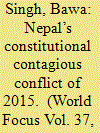

|
|
|
|
|
| Summary/Abstract |
Nepal has been undergoing a swift and unparalleled transformation in the political arena on account of factors like absence of unity among political parties, inadequate political participation for minority and ethnic people, economic weakness and vested interests of regional and external powers in the country's stability. Since 1950, Nepal has seen six constitutions and last one was promulgated on September 20, 2015 after the seven years grueling efforts of Constituent Assembly-1 and Constituent Assembly-II (2008-2015). The scholars, analysts, politicians of Nepal have been considering it as a very progressive and inclusive document. However, it has proved more contentious and controversial as the one-third Nepalese population (Madheshi people), who perceived it as discriminatory and exclusive one. It has created political paralysis in Nepal creating a lot of contagion effects of cold and cough for India as well.
|
|
|
|
|
|
|
|
|
|
|
|
|
|
|
|
| 12 |
ID:
179094
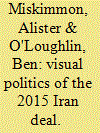

|
|
|
|
|
| Summary/Abstract |
This article explores the role of visuality and narrative in the forging of the 2015 nuclear deal between Iran and the United Nations Security Council P5 + 1. We advance strategic narrative theory by explaining how narrative alignment between longstanding antagonists can occur through protagonists’ coordination of communication – a methodology of orchestration – across public and private spaces of diplomacy. Analysis of news, policy and social media materials as well as interviews with protagonists allows us to trace the gestures and performances through which actors sought to reinforce or overcome an identity narrative of Iran as untrustworthy and dangerous. We draw on Foucault’s concept of alethurgy to show how verification mechanisms were constructed to ensure Iran’s actions (if not its intentions) could be brought into public view. US and Iranian leaders’ political will was significant, and sanctions and sabotage exerted considerable pressure on Iran. This article demonstrates how communication can enable alignment and peace-making rather than confusion and conflict in world affairs.
|
|
|
|
|
|
|
|
|
|
|
|
|
|
|
|
|
|
|
|
|